|
|
|
Sort Order |
|
|
|
Items / Page
|
|
|
|
|
|
|
| Srl | Item |
| 1 |
ID:
144939
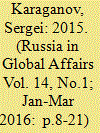

|
|
|
|
|
| Summary/Abstract |
The year 2015 will go down in history as a watershed. Firstly, it was extremely rich in anniversaries. The world marked 70 years since the establishment of the United Nations, an organization that laid the foundations of the postwar system of international relations. It was also 70 years since the tragic beginning of the nuclear age when two Japanese cities were bombed. The emergence of nuclear weapons was perhaps the most important event of the postwar period in world history. Last year saw the 40th anniversary of the Helsinki Final Act, the 25th anniversary of the fall of the Berlin Wall, and the adoption of the Charter of Paris for a New Europe, a document that promised a fair and stable European security system. However, 2015 finally turned that ideal into a shattered dream. Secondly, and most importantly, 2015 marked the end of the postwar era and the post-Cold War period. Now we are entering an era shaped by new major international trends that are coming to the fore. Thirdly, last year was perhaps the most successful for Russian foreign policy in the last quarter of a century. Yet it did not solve Russia's main problem: the deepening stagnation of the economy that can reverse any progress.
|
|
|
|
|
|
|
|
|
|
|
|
|
|
|
|
| 2 |
ID:
144945
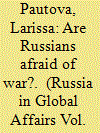

|
|
|
|
|
| Summary/Abstract |
Social phenomena do not usually occur suddenly but ripen gradually. Often social manifestations hide behind seemingly insignificant fashionable trends. The fear of war in recent years is revealed in worried, although almost invisible, attitudes expressed during opinion polls. Concurrently, a military style trend has slowly but steadily entered everyday life: paintball and shooting sports are incredibly popular; teenage girls wear combat boots, camouflage clothing, and dog tags. Indeed, T-shirts with images of "Polite People" and the Iskander and Topol missile systems are in high demand. If we put these fashion trends into the context of the nationwide celebrations of the 70th anniversary of the victory in World War II, the military theme is hard to miss.
|
|
|
|
|
|
|
|
|
|
|
|
|
|
|
|
| 3 |
ID:
144955
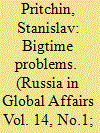

|
|
|
|
|
| Summary/Abstract |
The Caspian Sea has suddenly come into focus, drawing the attention of not only the five littoral states and oil and gas producers, but also the political and military actors involved in the Syrian conflict. On October 7, 2017, Russia's Caspian Flotilla fired Kalibr cruise missiles at Islamic State targets, demonstrating the high efficiency of its precision weapons, and ability to deliver strikes in remote areas using a limited task force that the West had not taken seriously before. The redeployment of troops to Syria and the use of Caspian Flotilla ships clearly showed that Russia could promptly come to consensus with its neighbors in the region-Azerbaijan, Iran, and Iraq.
|
|
|
|
|
|
|
|
|
|
|
|
|
|
|
|
| 4 |
ID:
144943


|
|
|
|
|
| Summary/Abstract |
In NATO and some Western capitals, there are those who point to Russian aggression, neo-imperialism and even militarization, thanks to the sharp increase in Russian defense spending. Russia is seen to be part of an arc of crisis around the alliance, "tearing up the international rule book" and threatening Euro-Atlantic security. Seen from Moscow, however, the picture appears rather different. Indeed, official Russian documents and speeches also point to a wider international environment that is seen to be increasingly unstable, even threatening; indeed it can be said that Russia also faces an "arc of crisis" around it.
|
|
|
|
|
|
|
|
|
|
|
|
|
|
|
|
| 5 |
ID:
144956
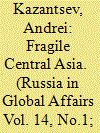

|
|
|
|
|
| Summary/Abstract |
Today post-Soviet Central Asian countries are facing problems caused by old security challenges and the emergence of completely new threats. These threats may hamper the future of secular statehoods in the region and present a serious obstacle to modernization.
|
|
|
|
|
|
|
|
|
|
|
|
|
|
|
|
| 6 |
ID:
144948


|
|
|
|
|
| Summary/Abstract |
Speaking in Kazakhstan on September 7, 2013, Chinese President Xi Jinping proposed the concept of a Silk Road Economic Belt (SREB) based on an innovative model of cooperation. It is intended to strengthen economic ties, deepen cooperation, and expand space for development. The statement by the new leader on Chinas future policy in Eurasia was a signal to mobilize comprehensive economic cooperation between China and Eurasian countries, and an important message to Central Asia and all regions adjacent to the Silk Road.
|
|
|
|
|
|
|
|
|
|
|
|
|
|
|
|
| 7 |
ID:
144951
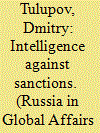

|
|
|
|
|
| Summary/Abstract |
"There is no black and white, only shades of gray." Oh, yes! There are fifty of them if some people are to be believed... Yet, setting aside irony, the wide palette of "gray schemes" easily comes to mind to describe the perspectives of many strategic Russian industries (oil and gas, shipbuilding, aerospace instrument engineering, and microelectronics) struggling for survival amid Western sanctions.
|
|
|
|
|
|
|
|
|
|
|
|
|
|
|
|
| 8 |
ID:
144946


|
|
|
|
|
| Summary/Abstract |
News that might radically change the habitual picture of the global economy and attract everyone's attention does not happen often now. Fundamental changes usually take decades to materialize. One such example was the emergence of new leaders-China, India, and Brazil-in the world economy at the turn of the century. However, the year 2015 was marked by events whose effect on the global economy and trade will most likely be significantly felt in the next few years.
|
|
|
|
|
|
|
|
|
|
|
|
|
|
|
|
| 9 |
ID:
144941
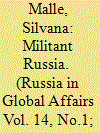

|
|
|
|
|
| Summary/Abstract |
Ostracism from the advanced international community pursued through a number of measures from early 2014 is largely responsible for the rise of a "militant Russia" whose features mirror patriotic sentiments and attachment to the country's own values, interests and goals. Resentment over the diminished status of Russia and the will to restore the image of a great nation are shared by a large majority in society. Support for the leadership is considerable, though not blind, as suggested by occasional shifts in ratings. The nation withstands external and internal disruptions, changes in foreign policy and economic uncertainties with remarkable endurance and cohesiveness.
|
|
|
|
|
|
|
|
|
|
|
|
|
|
|
|
| 10 |
ID:
144942


|
|
|
|
|
| Summary/Abstract |
There is no dispute that present-day Russia is a more assertive power than it was a few years ago. This assertiveness and willingness to stand firm in the face of Western criticism and sanctions has become especially evident since the onset of the crisis and conflict over Ukraine. However, it could be argued that this turn to a more assertive, indeed militant, stance began before 2014. Perhaps the Ukraine crisis simply served to accentuate a trend of development that was already present. Here we explore this issue by looking in some detail at the military face of what can be termed 'militant Russia.'
|
|
|
|
|
|
|
|
|
|
|
|
|
|
|
|
| 11 |
ID:
144953


|
|
|
|
|
| Summary/Abstract |
Last year in California I had a conversation with an investment banker, looking out from his 40th floor office over San Francisco Bay. We talked about the information economy. The information economy is the engine of 21st century capitalism. It underpins global economic growth and opportunity. The information economy both rides on, and fuels, the growth of what I am calling the Network, which includes the Internet, social media, and all the connected devices that send, receive, store, or process information in digital form.
|
|
|
|
|
|
|
|
|
|
|
|
|
|
|
|
| 12 |
ID:
144947
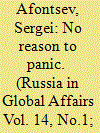

|
|
|
|
|
| Summary/Abstract |
The formation of the Trans-Pacific Partnership (TPP) has a good chance to become a turning point in the development of regional economic cooperation. Now that the first wave of both enthusiastic and angry comments on the TPP agreement has subsided, it is time to ask the main question: What is its novelty for the world economy and politics?
|
|
|
|
|
|
|
|
|
|
|
|
|
|
|
|
| 13 |
ID:
144940


|
|
|
|
|
| Summary/Abstract |
In 2012, I predicted a large-scale political crisis in Ukraine at the end of 2013 and early 2014. I expected to see Ukrainian President Victor Yanukovich disappear from the political stage, Ukraine reject Russia's integration projects, the rise of separatist sentiment in Crimea, an economic crisis in Russia starting in the fall of 2014, an exchange rate of 60 rubles/$l in 2015, and an escalation of tensions in Nagorno-Karabakh. It seems my forecast was based on the right assumptions and has proven correct.
|
|
|
|
|
|
|
|
|
|
|
|
|
|
|
|
| 14 |
ID:
144950


|
|
|
|
|
| Summary/Abstract |
The strategies of actors who compete globally are changing at an unprecedented rate. In the modern world, war as a foreign policy instrument seems too risky and is employed only as a last resort. It might seem that hard power has given way to soft power; yet soft power has also failed. The West, which employed soft power so successfully over the past decades, has become bogged down in an array of problems and many developing countries no longer look to the West as an example. Andrew Bishop of Eurasia Group is certain that military power is giving way to the power of standards as a new form of domination. Its key feature is the ability of countries to set their own rules in the regulatory space.
|
|
|
|
|
|
|
|
|
|
|
|
|
|
|
|
| 15 |
ID:
144949
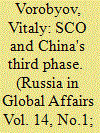

|
|
|
|
|
| Summary/Abstract |
What has the Shanghai Cooperation Organization (SCO) done to benefit its operation over the past fifteen years? During this time the SCO has experienced vigorous and extensive growth. It has launched a variety of diversified mechanisms intended to promote concerted action along three main lines-security and stability, trade and economics, and culture and humanitarian affairs. While the SCO has not been as effective in all of these spheres as it planned initially, its geographic expansion has been unexpectedly rapid. In addition to six founding states (Kazakhstan, Kyrgyzstan, China, Russia, Tajikistan, and Uzbekistan), the SCO now includes six observer countries (Afghanistan, Belarus, India, Iran, Mongolia, and Pakistan) and six dialogue partners (Azerbaijan, Armenia, Cambodia, Nepal, Turkey, and Sri Lanka). The SCO has won wide international acclaim, of which its observer status at the UN General Assembly is unmistakable evidence.
|
|
|
|
|
|
|
|
|
|
|
|
|
|
|
|
| 16 |
ID:
144944


|
|
|
|
|
| Summary/Abstract |
Against the backdrop of heightened international tensions and economic warfare between the West and Russia, there are signs that the configuration of Russia's system of political economy is changing. Russia's economic policy debate is increasingly characterized by an emphasis on self-reliance that is justified in the name of security, with economic policy subsumed within a wider effort to insulate Russia from a growing array of internal and external threats. It is this tendency towards economic securitization that is the subject of this article.
|
|
|
|
|
|
|
|
|
|
|
|
|
|
|
|
| 17 |
ID:
144952
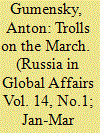

|
|
|
|
|
| Summary/Abstract |
All propaganda has side effects. The negative aspects of those effects may eventually outweigh the expected benefits. In international relations propaganda foments hostility, disrupts dialogue, and causes those who dispense it to behave in an unpredictable manner. Like any instrument, propaganda may backfire. It formats not only the target audience, but the author as well. This is particularly true when the author is not just reluctant to take a critical look at how the desired ends were achieved, but when that author denies the very possibility that such influence exists.
|
|
|
|
|
|
|
|
|
|
|
|
|
|
|
|
| 18 |
ID:
144954


|
|
|
|
|
| Summary/Abstract |
Ukraine is a particularly important country for Russia and will remain so for the foreseeable future. The two countries are united not only by history and religion, but also by structural social and economic ties inherited from the Soviet era. In fact, those ties account for a double-digit percentage of the countries' respective GDPs. However, Russian-Ukrainian interdependence has been decreasing since 2004 due to choices made by the Ukrainian elite and continuing political instability in Ukraine. Russia believes that the hostile regime in Ukraine will remain in power for a long time. This factor has forced Russia to continue reducing its dependence on Ukraine. It is in the interests of both countries to ensure that the process of reducing interdependence is both gradual and carefully thought out.
|
|
|
|
|
|
|
|
|
|
|
|
|
|
|
|
|
|
|
|
|